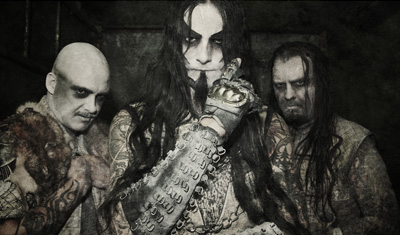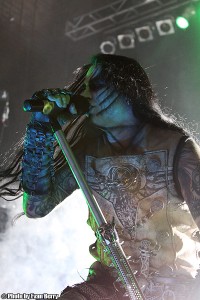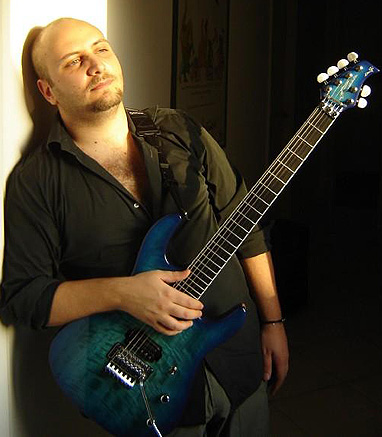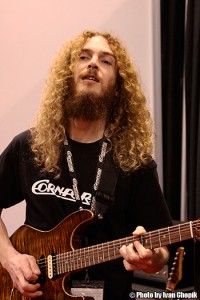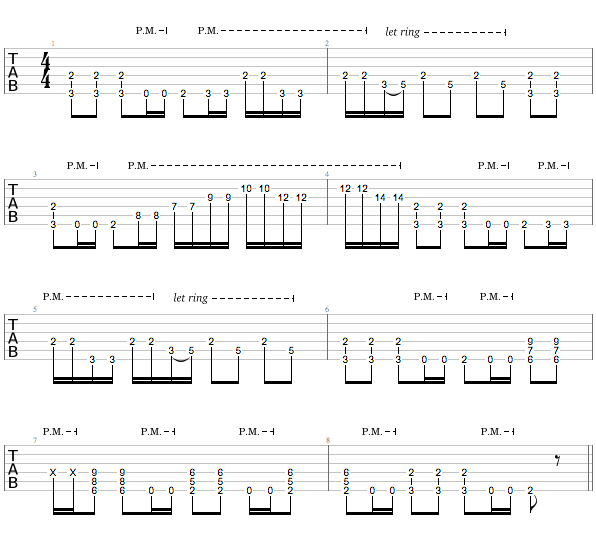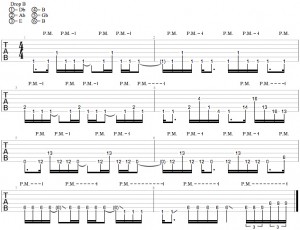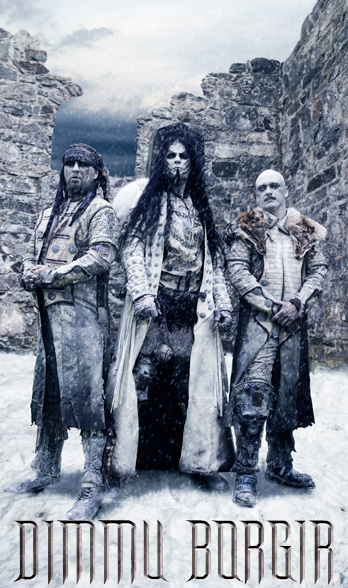 Dimmu Borgir’s international success in a genre that celebrates dissonance and gritty production is nothing short of remarkable. Since their formation in 1993, Norway’s Dimmu Borgir have expanded their sound with each new release – from harsh, atmospheric black metal, to full-blown symphonic metal, complete with full orchestra and choir.
Dimmu Borgir’s international success in a genre that celebrates dissonance and gritty production is nothing short of remarkable. Since their formation in 1993, Norway’s Dimmu Borgir have expanded their sound with each new release – from harsh, atmospheric black metal, to full-blown symphonic metal, complete with full orchestra and choir.
The interplay between guitars and orchestration is an essential feature of Dimmu Borgir’s sound, and it’s showcased exceptionally on their latest album, Abrahadabra. The masterminds guiding this dark harmony are the the band’s guitarists and riff engineers, founding member Silenoz and Galder, who joined the band before their 2001 release Puritanical Euphoric Misanthropia. I was fortunate enough to sit down and talk with Silenoz and Galder in Worcester, MA at the launch date of their North American tour:
EB: You guys just got back from touring in Europe. Can you tell me a bit about that?
G: We had a headlining tour and an opening act tour with Korn. We had like nine shows with Korn, and the rest was headlining with Enslaved and a Norwegian band called Sahg, so they were all Norwegian [on that tour]. It’s a pretty new tour for us to do something like that. It was cool opening up for Korn, as well – something new for us.
EB: How did the crowd respond to that, considering it’s stylistically pretty different music from yours?
G: It was very good. Of course some of the Korn fans had never heard us, and some of the Dimmu fans had probably not heard all of the Korn stuff – but it seemed to be very good reactions.
S: The whole point of that tour was to try and reach out to some new fans. You could tell that some of the kids that had the Korn t-shirts were like… [bangs head]
EB: I know you have toured in North America a good amount. How would you compare the tours you’ve done here to Europe, or anywhere else in the world? Any major differences?
G: Here you have the mosh pits going on – you don’t really have many mosh pits in Europe. It’s two different places, but I mean, metal fans are metal fans – they’re all dedicated wherever you play. It’s always been good for us in the States – we’re always happy when we come here to play, and the crowd seems to treat us very good. It’s been great.
EB: Before you go on stage, do you guys have any sort of routines you like to go through to get prepared?
G: Rituals? Sacrifices? [laughs]
S: We shouldn’t talk about that really, because we’ll get in trouble.
G: Our ritual before we go on stage is to put our makeup on and just relax and wander around the backstage area, preparing mentally. That’s pretty much it – just focus, get ready to do the job, psyche up.
EB: Let’s talk about the new album, Abrahadabra. I believe it means ‘I will create as I speak.’ Silenoz, as the main lyricist for Dimmu, can you talk about some of the themes or concepts behind the name and album?
S: It’s not really a concept album, but some of the lyrics share the same theme. We have a song that’s directly about the band as well, appropriately named ‘Dimmu Borgir.’ We wanted to do something different – break up the three-word album title pattern that we had for the last few albums, just basically do something new. It felt fresh and correct to do it.
| [flashvideo file=”https://guitarmessenger.com/wp-content/uploads/2010/11/dimmuborgir.flv” width=450 height=273 image=”https://guitarmessenger.com/wp-content/uploads/2010/11/Dimmu-Borgir-Video1.jpg” /] |
EB: You guys have a very new image going on in the video and promotional pictures. Can you talk about that?
G: We thought that this album sounded a bit different than what we’d done before, so we also wanted to have a new style with the clothing and the image. It’s boring to do it the same over and over again. As a musician, you want to evolve and do different stuff, and white was very new to the black metal scene.
S: We knew there would be a lot of reaction to what we did, because it’s a bold move to step into white. But give people another year, and there will be other bands that probably will attempt the same thing.
A lot of the metal community are very conformist and very conservative – they’re not really ready for change all the time. So when we do something like we did on this album, obviously there’s going to be reactions to it.
G: But this is not the permanent style – you never know with Dimmu Borgir. On the next album, we might do something completely different. It’s good to go some new directions once in a while, when you play in a band, at least for us.
EB: The album very much has a new progression to it. Do you have any ideas of where you want to move next? Any future plans?
G: This album is pretty new, so we haven’t really started thinking that far. But of course, we always want to do something new and make the band progress, make it fresh. We don’t want to stay in the same place all the time. We want to evolve. Of course the next album might be completely different, with a completely different image, as well.
S: The good thing about it is that it takes us two to three years between each album, and during that time, you are bound to make some changes naturally, both musically and as a person, and as a musician, as well. It’s just a natural progression. I know it’s a cliché to say that, but every musician that changes a little bit from album to album will look at it the same way as we do.
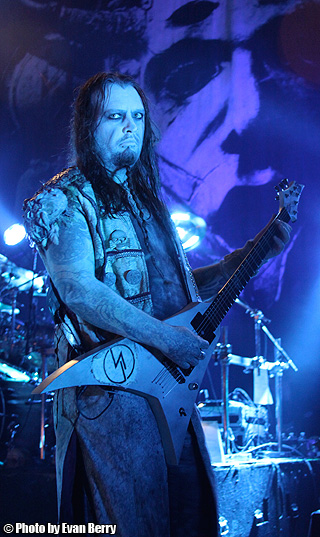
Silenoz
EB: As the guitarists, do you write the guitar parts first and then try to add the orchestration, or is it the other way around?
G: I don’t think we have a formula that we use. If we have a good basic guitar riff, then we just start with that and then put drums on top. Then we can add the keyboards on top of that, or guitar fills, or whatever. If we have a good keyboard part, then we just use that first and put the guitars on top of that. So we don’t really follow a certain formula – it really depends on the riff. We always have a good basic opening riff, and then we start from there, and find all the stuff that matches that opening riff. That’s the most important thing, to have a good opening riff. That might be guitars, or orchestral stuff, or whatever.
EB: Are there ever any difficulties in working with the orchestrator, or in trying to get your ideas across to a full orchestra and choir?
G: I don’t think so, because the guy we work with now [Gaute Storaas], we also worked with him before on two other albums. It’s pretty much like, the stuff we do on keyboards, he just transfers that into the orchestra. He basically says to each instruments to play what, because we’re really not that familiar with violins and cellos and stuff like that.
Once we have the keyboard ideas down, we just meet up with the orchestral producer and we share the ideas of how we want it to sound, and he can maybe come up with some ideas as well. So we just take it from there – it’s been very smooth. He knows what we like and don’t like, so there haven’t been any problems. We work very close and meet regularly, for this album at least.
EB: Are you guys pretty happy with the outcome?
G: Yeah, there’s a lot of stuff going on, a lot of orchestration – we just wanted to make an album that’s more epic than we’d done before. So I think this is an album that you can’t really listen to once, because there’s just so much stuff. You need to listen to it maybe like ten times in order to hear everything that’s going on.
But yeah, I’m very happy with it. It’s been a very long process – we recorded in many different studios. We started at home in our home studio, then we recorded some stuff in Sweden – the vocals and drums – and then we recorded the guitars in Norway. Then we did the orchestra in another studio in Norway, and we mixed it in England with Andy Sneap. So I guess that was like the hardest job, to mix all this stuff down because there were so many layers. It’s definitely the hardest album we’ve done.
EB: The orchestrator you used for this album is an alumnus of Berklee College of Music, which is just about an hour outside of where we’re sitting now. Do you have any thoughts about formal music education? Have you had any sort of musical training?
G: No no, we don’t know a single note. That goes for everyone in the band – we don’t have any education at all. We’re self-taught, but we always shared ideas with each other when we were kids growing up, and just learned the music from albums – listening to albums and learning them on the guitar and stuff like that. We grew up listening to classical music as well as metal – with the hard stuff, we also listened a little bit to the classical. There are a lot of classical elements in many types of metal. It’s just the natural process for us to incorporate some classical music into this music.
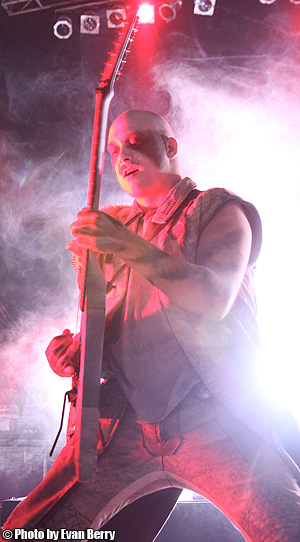
Galder
EB: As you’ve progressed as a band, have your influences changed over time? What were you listening to when the band started, and are you listening to anything really different now?
G: We’ve been doing this for many, many years, so of course you go through periods in your life where you listen to different stuff. But I think we like to listen to the stuff we listened to when we were kids, like the old 80’s metal, thrash metal and heavy metal, and the early black metal from the early 90’s. So we still listen to that regularly, but we’ve also grown up a little bit, so we listen to a lot more diverse music now than we did. It’s not just metal anymore – we listen to all sorts of stuff.
But that is the soul of the band – the old metal, the old black metal. That’s still very close to us, in those regards. We’re not incorporating like… If someone in the band likes country or something, we won’t incorporate that into Dimmu Borgir because it’s just a completely different style. We want to keep Dimmu ‘Dimmu’ and keep it metal.
EB: Do you find that there’s anything, especially for the new album, that’s particularly influenced the sound?
G: It’s hard to say. I mean, we’re three different individuals, and we kind of like different stuff. I think when you mix those elements, it gives it a certain sound. It doesn’t sound like typical thrash metal, or typical black metal, or whatever. But of course, that’s what we listen to – it’s also in the music, on the new album.
EB: Galder – I want to ask about your band, Old Man’s Child, which, as far as I know, you’re still pretty involved with.
G: No, not really, I’ve had a break since the last album.
EB: How was it trying to balance Dimmu Borgir and Old Man’s Child?
G: It’s not really that abnormal to have different bands when you play in the black metal scene. Most of the musicians, they play in like 3 or 4 different bands. Dimmu is one of the biggest bands in the black metal scene, so we tour a lot, but with Old Man’s Child I don’t tour so much. If I was out on the road with a band for 4 or 5 months, I wouldn’t be able to do it. But since we don’t tour that much, I am able to do the two bands. It’s been working really good – no problems so far. It’s been very smooth.
EB: Has Dimmu Borgir taken a lot of your time? Is that why you stepped back from Old Man’s Child?
G: No, that’s not really the reason. I feel like the two bands are pretty equal – so why play in two equal bands, or release two similar albums? I like to focus on Dimmu Borgir right now and do my best there. Then when I have the time, I might record another album [with Old Man’s Child]. We’ll see.
EB: For a lot of bands nowadays, especially in extreme metal, the most lucrative part of their career is touring and merchandising. What do you guys find is the backbone of your career, financially?
G: Touring. If you don’t tour, you don’t have a chance, if you want to make some money from it. Dimmu Borgir, I think, is one of the hardest working bands in many ways. We’re very serious with what we do and we work very, very hard. We try to do all the interviews, we try to always meet up several days a week just to make songs and share ideas.
So we work very hard with this and then we do the touring. We tour a lot – but we don’t want to tour too much. We like to keep the band a little bit mystical, you know? So when we tour, we tour a lot, and then we take a break for a year or two, and then we tour a lot again. We don’t really believe in touring like, going to America 3 times a year – it’s not for us. But we still do a lot of touring, and that’s what keeps us going.
EB: What gear did you use on the new album?
G: Me and Silenoz have two different rigs. He plays a Blackstar. It’s an English brand, it’s a pretty new brand. Some old Marshall guys started making some new amps, so that’s pretty cool. I used the Peavey 6505+, which is a great amp. I just used that on this album – I hadn’t used that before. It’s a classic amp, and it sounds really good. We mixed those two amps together – we had the Blackstar on one side and the Peavey on the other side. We used ESP guitars, both of us.
EB: You guys are moving forward now as, essentially, a three-man band. How is that changing things as far as how you write songs and how you work together, compared to past albums?
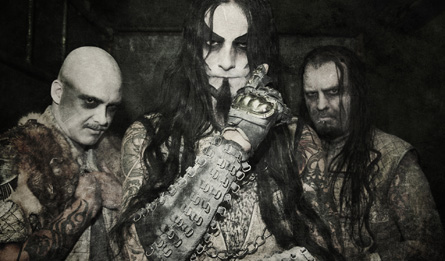
Galder, Shagrath, Silenoz
G: It makes it a bit easier, actually, because it’s less people. Us three have always been the main elements making the songs, anyways.
S: It’s not a big difference at all, really. It’s just that it’s easier now to just be three people concentrating on the work together.
G: In many ways, this album has been the easiest work we’ve done. We worked really hard with it, but at the same time, it was quite easy because we share the same tastes in a lot of stuff.
EB: I know it was a bit of a heated moment when you had to part ways with Vortex and Mustis. Did you see that as an inevitability?
S: Yeah, unfortunately, sometimes you drift apart. It’s like in marriage. When you’re not on the same wavelength anymore, and you seem to have lost your focus and passion and you’re in it for the wrong reasons, then you have to do what you have to do to save what’s left of it. And that’s what we did.
G: Most bands that play, say, for 17 years like Dimmu Borgir’s done – most of those bands have changed their lineup. I don’t think we’re the only one in the world that’s changed the lineup. It’s just a natural thing in a band.
EB: Can you talk about what you do outside of music?
G: We’re pretty normal – we do normal stuff. Some of us have families and stuff. [To Silenoz:] I don’t know, what do you do? Fishing?
S: Yeah, fishing.
G: Skiing?
S: Sometimes, yeah, when I have the time. But the band is pretty much a 24/7 type of thing. It’s not like you can turn off your cell phone at five in the afternoon. It doesn’t work like that. There’s always stuff you can do that concerns the band – whether it’s interviews, promotion, administrative stuff or anything.
G: It’s a 24/7 job for, sure.
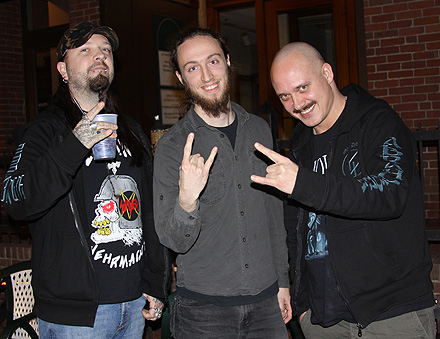
Evan Berry with Silenoz and Galder
S: But it’s not even looked upon as a job, because we enjoy it. The word ‘job’ for me is negatively loaded.
G: 24/7 hobby. [laughs]
EB: Since you have been involved in the symphonic black metal scene for so long, how do you see how that scene has progressed over the years? Where do you see Dimmu Borgir in all of that?
S: It’s hard to say, because we don’t really look at other bands. Maybe people think that we listen to other symphonic black metal bands, but we don’t. It’s the type of music we make, yeah, but we listen to all different types of music. We draw influences from anything, really.
G: We want to do our own thing and not follow in a certain path. If there’s a rule that you have to do this and that, we don’t care. We do our own thing.
EB: Do you have any advice you could give to aspiring musicians trying to make it in the metal world?
S: Yeah, don’t. [laughs]
G: Just work really hard with what you do, be passionate about what you do, and never quit. Sometimes you might be disappointed and it might take several years to get there, but if you believe in yourself, then everything is possible. If we can make it, then everyone can make it. And it’s also a bit of luck.
S: Yeah, you need luck. You need to be at the right place at the right time, several times.
G: Don’t follow any trends or anything like that. Do your own thing.
S: Don’t listen to everyone that thinks they know better. That doesn’t work.



